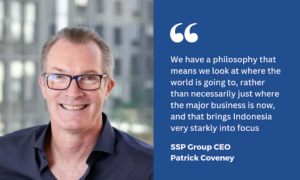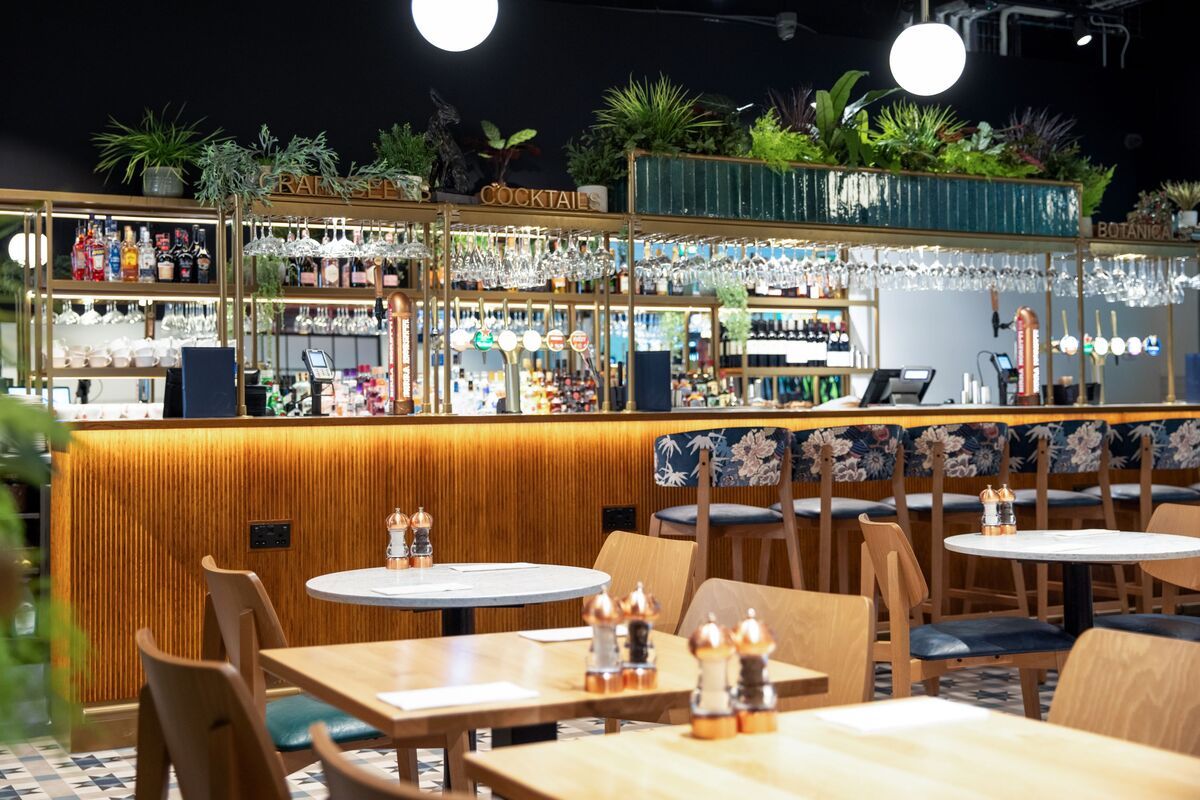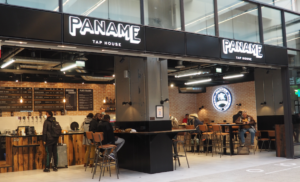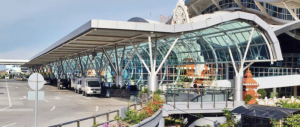INTERNATIONAL. In a big day of news from SSP Group, in which the global travel restaurateur announced strong first-half results and entry into the Indonesian airport market, CEO Patrick Coveney spoke to The Moodie Davitt Report about the company’s strong momentum across the world.
As reported, the company generated revenues of £1.5 billion (US$1.91 billion) in H1, up +19% on a constant currency basis against the same period of last year, also achieving double-digit growth across all regions.
Giving his reaction to those impressive numbers, Coveney, who joined SSP as Group CEO in March 2022, told us: “As the results clearly show, our business is performing well and is being driven by very good top-line momentum. It’s great to see that momentum has continued in the first six weeks of the second half, where our sales are still +14% higher year-on-year.

“Those results are a function of really good work from our management, very good work with our partners and really engaged work with our teams in the stores to make sure we’re serving customers well. That’s very important for building revenues.”
To emphasise improved customer satisfaction and its effect on driving sales, Coveney referenced SSP’s customer review platform, named Reputation, which he said is being deployed at a high scale across the company’s global F&B business.
“We can see the improved customer regard for their experiences with SSP,” said Coveney. “Globally, ratings have risen from 4.2 to 4.4 out of five in the last six months. And in our big UK market, we’ve gone from 4.1 to 4.6 over the course of 12 months. Our business has really jumped forward in its ability to serve customers well and ultimately that’s really important.”
Regional performance
Reflecting on regional business performance, Coveney described the H1 results for the SSP UK & Ireland division as “good” but expressed great satisfaction with profitability in the USA (+45% rise in profitability) and Asia Pacific (+26%).
Addressing a sharp year-on-year fall in profitability across SSP’s Continental Europe operations, Coveney cited mitigating factors including heightened contract renewal levels, particularly in the Nordic countries, and the effects of industrial action on the rail industry in Europe, most notably in Germany and France.

He commented: “In a business that is in nearly 40 countries now, you’re always going to face different issues in different parts of the world but the overall portfolio has good profitability, with EBITDA up by +24% year-on-year to £106 million (US$134.8 million) in the first half across all markets. There is good momentum everywhere, but there are parts of the world that are stronger than others, as you would expect.”
Coveney added: “The guidance we gave for the full-year performance last December, we are trading very much in line with that, and that obviously implies a very, very strong second half everywhere. We’ve basically got to get 70% of our full-year profits in that period.”
Coveney gave insights into how those profits will be achieved, noting that the SSP business “is becoming more and more weighted to the summer of the Northern Hemisphere”, where the company continues to increase its strength in the leisure air travel market. “The European, North American holiday season is a huge driver of traffic, a huge driver of demand and sales and a very important period for profit conversion,” he said.
A major driver of revenues and profitability for SSP this summer will come from two major sporting events: football’s UEFA Euro 2024, being played in major cities throughout Germany; and the Olympic and Paralympic Games in Paris.
“We’re doing a lot of work to optimise our serving of customers and the performance elements around that,” noted Coveney. “We have an excellent network of venues across major cities in Germany and we have a huge airport and rail F&B business in Paris with 160 units in total, between what we own ourselves and what we have in joint ventures with airports.

“We’re going to see a lot of traffic going into and across Germany and into Paris and we’re setting ourselves up well, with our teams in-store, with our partners and with our supply partners, to make sure we do a really good job for customers attending the events.”
Entry to Indonesia
A key theme that came out of SSP’s H1 results was the company’s very active M&A agenda, including a previously unreported acquisition that has broken the company into the USA’s busiest airport, Hartsfield-Jackson Atlanta International, for the first time.
As reported, the company also announced an acquisition and resulting joint venture which will give SSP a strong foothold in the highly promising Indonesian airport F&B market. SSP has acquired Indonesian food & beverage business PT Taurus Gemilang (TG), with the buyer holding 60% and the latter holding 40% of a newly formed JV company.
Under the JV, SSP will initially operate 13 outlets, 12 of which are located at Bali’s I Gusti Ngurah Rai International Airport and one at Juanda International Airport in Surabaya.
Asked about the attractiveness of the Indonesian market, Coveney noted that the country is the world’s fourth most-populous and an emerging market which is projected to become the fourth-biggest aviation market in the world by 2040. “Your colleague and Chairman Martin Moodie, I recall, discussed the potential of the market with me during the FAB conference in Thailand last year.

“We have a philosophy that means we look at where the world is going to, rather than necessarily just where the major business is now, and that brings Indonesia very starkly into focus. Our team, way before I joined, knew the Taurus Gemilang business pretty well.
“We’ve gone back and forth over the years on how we might work together and we’ve landed on a solution, which is the acquisition that we’ve described today. They’re going to stay with us as a minority partner, alongside in the vehicle going forward. We will operate TG’s existing 13 airport locations in Bali and Surabaya airports, and then we will use that as a platform to really drive business development and growth in the market.”
On the decision to go down the JV route, as opposed to going it alone, Coveney said: “That’s the SSP philosophy in many markets, not least in this part of the world. Team up with local partners, have that strong local presence and local relationships – that’s very important. You see that in how we go to market in Thailand, India, Malaysia, Saudi Arabia, Abu Dhabi, the Philippines – it’s a big part of how we run the business.”
Coveney himself has invested a lot of his personal time over the last couple of years visiting SSP operations across the world, including many locations in the Asia Pacific region, in a quest to better understand the global travel F&B business and engage with SSP market teams.
Asked what have been the major learnings from those trips, he replied: “It’s been very demanding but a real privilege to do it. It’s been about meeting our teams on all levels in all markets, and it also connects me into our clients, our joint-venture partners and our brand partners in those markets – it has really given me a window into what’s going on in the world.
“And I mean that not just from an F&B perspective, but seeing where the big infrastructure investment is happening, how consumers behave, how citizens are living their lives and how they’re travelling. It’s been enormously engaging to do the job that way.”

Strong competition
The interview closes with a discussion about competition in the airport F&B market, with the trend of more space being created for F&B in airports new and old. I suggest that competition must be intensifying, given the number of F&B contract stories we are regularly reporting and the big players all targeting constant growth, but this assertion is strongly refuted by Coveney. “While I accept the thesis that we have strong competitors, I think the idea that they have suddenly become more competitive is not entirely right. I think we’ve always been highly competitive and we continue to be.
“I can’t speak for others, but I can say we focus on the things we are good at, which is F&B – that’s something we can do very, very well. We and our competitors have got our particular geographic footprints, which are not exactly the same. Structurally, our geographic spread sets us up well when you look at where the growth is forecast to happen.”
He concludes: “I think our strength comes down to a very decentralised structure, with locally empowered sets of teams. A key principle for us is that we like to aggregate development and operations in such a way that we don’t have a central business development team; we deploy business development with our operating teams [in the regional and country markets].
“When they sign up to do something with a client, they are the people who end up being accountable for delivering it, and I think that works well for us as a company.” ✈
Note: The Moodie Davitt Report publishes the FAB Newsletter, which features highlights of openings, events and campaigns from around the world of airport and travel dining.
Please email Kristyn@MoodieDavittReport.com to subscribe.









